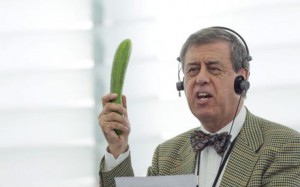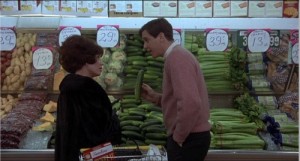Translated by Sol and Gonzalo Erdozain
“After closely following campaigns in favor of cucumber consumption, conducted by different media, government, etc., we conclude that a crises of this magnitude can lead to a sense of “patriotic pride,” which in this case transformed a simple vegetable into a national symbol. Our analysis, added to interviews with experts on the subject,  indicates that these campaigns not only minimized the effects of the crises but actually had a positive impact on the agriculture in Andaluz.
indicates that these campaigns not only minimized the effects of the crises but actually had a positive impact on the agriculture in Andaluz.
This is one of the main conclusions of the research article, “Media and food crises. The 2011 E. coli outbreak: The cucumber crises,” conducted by five students for a course in Expert in Gastronomic and Nutritional Journalism.
It’s been over a year and a half since those fateful days at the end of May and beginning of June 2011, when the Hamburg (Germany) Health Minister, Cornelia Prüfer-Storcks, accused Spain, and specifically Almeria, of being responsible for the E. coli outbreak victims in Germany linked to cucumber.
Without proof she pointed her finger to an agriculture system, thereby accusing the whole Almerian economic system, which is always innovating in quality materials, food safety, technology and research, is environment-conscious and sustainable, and an example for the community regarding fruit and vegetable exporting.
The industry, and Spanish society, caused an uproar regarding a subject that turned into an issue of rich country versus poor country, one who makes decisions versus one who abides by them, one who makes the most from commercial margins dressed in a suit versus one who earns their bread sweating under a greenhouse.
In spite of economic damage, approximately 27 million taking into account what was thrown out, and the reputation damage, which is still incalculable, he Almerian  agriculture industry was still able to pull through it strong, with estimates for 2011-2012 production numbers at a record high of three million tons and sales of 2.336 million Euros, competing with international markets and showing the world its strength in quality products and food safety, with perfect traceability methods, as shown with the E. coli.
agriculture industry was still able to pull through it strong, with estimates for 2011-2012 production numbers at a record high of three million tons and sales of 2.336 million Euros, competing with international markets and showing the world its strength in quality products and food safety, with perfect traceability methods, as shown with the E. coli.
